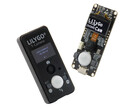Cluster systems utilize multiple identical or at least very similar systems in order to increase performance in various applications: the extent of the performance gain ultimately depends on the application and how well the boards work together. In this context, Sipeed is now offering a new solution for implementing such a cluster, and this one is particularly compact.
The NanoCluster can accommodate up to seven compact computing boards from various manufacturers. Specifically, the Sipeed Longon Pi 3H, the Sipeed M4N, the Raspberry Pi CM4, and the Raspberry Pi CM5 are supported. Compatibility is somewhat limited: The Raspberry Pi modules require an adapter, and the power supply could prove to be a bottleneck, so the board can be powered via USB-C with a maximum of 65 watts. Optionally, the power supply can also be provided via PoE and thus Ethernet. The Ethernet port supports Gigabit speed connections.
A USB-A port is on board, which, like the HDMI output, is assigned to the board installed in the first slot. Each board can be addressed individually via UART, which should make troubleshooting easier. A fan is built directly into the board, measuring 60 millimeters in diameter and intended to adequately cool all attached boards. The system measures 100 x 60 x 60 millimeters when fully stocked and can be ordered now for a minimum price of $45. With the Raspberry Pi CM modules for compatibility, the minimum price is $89.



















